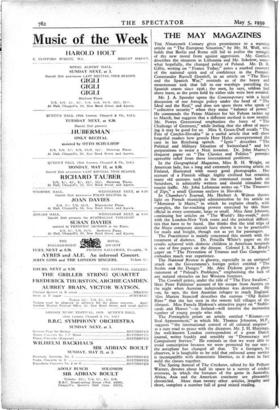THE MAY MAGAZINES
THE Nineteenth Century gives prominence to a warning article on " The European Situation," by Mr. M. Wolf, who holds that Berlin and Rome still fail to realise the strength of the new moral front against aggression. Mr. Gottlieb describes the situation in Lithuania and Mr. Sokolow, some- what hopefully, the changed policy of Poland. Mr. D. R. Gillie writing on " France Today," notes a marked recovery of the national spirit and of confidence in the Premier. Commander Russell Grenfell, in an article on " The Navy and the Spanish War," reminds us of the heavy and monotonous task that fell to our warships patrolling the Spanish coasts since 1936 ; the men, he says, seldom had shore leave, as the ports held by either side were best avoided.
Mr. J. A. Spender opens the Contemporary with a lucid discussion of our foreign policy under the head of " The Ideal and the Real," and does not spare those who speak of "collective security " when they mean " balance of power." He commends the. Prime Minister for his Fabian tactics up to March, but suggests that a different method is now needed. Mr. Powys Greenwood emphasises the force of "The Challenge of Germany," while .feeling that the effort of meet- ing it may be good for us. Miss S. Grant-Duff recalls " The Fate of Czecho-Slovakia " in a- useful article that will show forgetful readers how grossly Herr Hitler misrepresented the case in his Reichstag speech.. " Ignis " describes " The Pnlirienl and Military Situation of Switzerland " and her preparations to resist a Nazi invasion. Dr. John Murray's eloquent paper on " The Classics and Politics " provides agreeable relief from these international problems.
In the Geographical Magazine, Miss B. H. Wright, an American lady, has a long and extremely interesting article on Finland, illustrated with many good photographs.. Her account of a Finnish village, highly civilised but retaining many old customs such as the communal steam bath on Saturdays, is admirably written and should stimulate the tourist traffic. Mr. John Lehmann writes on " The Treasures of Zips," a small Qerman enclave in Slovakia.
In Chambers's Journal, Mr. Herbert A. Walton throws light on French municipal administration by his article on " Monsieur le Maire " in which he explains clearly, with examples, the far-reaching powers exercised by this State official in every commune, large or small. Miss Amy Johnson, continuing her articles on " The World's Sky-roads," deals with the London-New York route and the practical difficul- ties that have to be faced. She thinks thit the trial trips of the Mayo composite aircraft have shown it to be practicable for mails and freight, though not as yet for passengers.
The Practitioner is mainly concerned this month with the treatment of diabetes. Dr. Priscilla White's paper on the results achieved with diabetic children in American hospitals is one of five papers on the disease. Colonel J. S. K. Boyd's paper on " The Prevention of Tetanus and Gas Gangrene " embodies much war experience.
The National Review is gloomy, especially in an unsigned attack on the Government's foreign policy entitled " The Realm and, the Danger." Mr. Alec Dickson gives a plain statement of " Poland's Problems," emphasising the lack of any natural obstacles on her Western frontiers. The Cornhill prints, under the title of " The First Swallow," Herr Peter Fabrizius' account of his escape from Austria on the night when Austrian independence was destroyed. He was, he says, the first Austrian refugee to reach England. Miss Marion Stancioff describes the curious Old Italian Rites " that she has seen in the remote hill villages of the Abruzzi. Miss Pamela Hinkson's attractive paper on " Stable- yards and Horses "-in Ireland-will interest the increasing number of young people who ride.
The Fortnightly prints an article entitled " Kismet-or Real Appeasement," in which Mr. Thomas Johnston, M.P., suggests "the international control of all colonial empires" as a sure road to peace with the dictators. Mr. J. H. Huizinga,
the well-known London correspondent of a great Dutch journal, writes frankly and sensibly on- "Democracy and
Compulsory Service." He reminds us that we were able to avoid conscription because we were protected by our seas ; the aeroplane has changed all that. To a foreigner, he observes, it is laughable to be told that enforced army service is incompatible with democratic liberties, as it does in fact weld the classes together.
The Spring Annual of The Cricketer, edited-by Sir Pelham Warner, devotes about half its space to a survey of cricket overseas, in which the fortunes of the game in Australia, Africa, Asia and the American continent are pleasantly chronicled. More than twenty other articles, lengthy and short, complete a number full of good mixed reading.














































 Previous page
Previous page